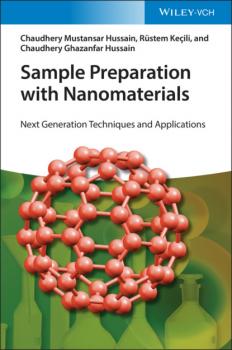Химия
Различные книги в жанре ХимияApplied Soil Chemistry
This book explores the state-of-the-art information regarding applied soil sciences. It covers the fundamentals, model concepts, principles, chemical reactions, functions, chemical recycling, chemical weathering, acid-base chemistry, carbon sequestration, and nutrient availability of soils. Also, it includes soil chemistry of heavy-metals, environment, clay, ion-exchange processes, analytical tools and applications. This book helps to understand the about soil characteristics targeting soil chemical reactions and interactions and its applications.
Diarylethene Molecular Photoswitches
A comprehensive review to the synthesis, properties, and applications of diarylethene-based molecular photoswitches<br> <br> Diarylethene Molecular Photoswitches: Concept and Functionalities provides the fundamental concepts of molecular photoswitches and includes information on how the bistable photoswitches of diarylethenes modulate the functions of materials and biological activities. Written by Masahiro Irie (the inventor of photochromic diarylethene compound), the book explores the reaction mechanism, photoswitching performance, photoswitchable crystals, and the myriad applications of diarylethenes based photoswitches. <br> <br> This book offers academics, chemists, and engineers an essential resource for understanding the molecular photoswitches and provides a guide to the development of new photoresponsive materials. The author explores the applications based on diarylethene and its dirivatives to Field-Effect Transistors, Metal-Organic Frameworks including nanoparticles, super-resolution fluorescence microscopies, drug release, and self-healing materials. This important book: <br> <br> * Offers a guide to diarylethene derivatives, the most widely studied compounds worldwide among the photochromic compounds<br> * Includes the basic concepts of molecular photoswitches<br> * Explores the myraid applications grounded in diarylethene and its derivatives <br> * Presents an authortative text from the inventor of the photochromic diarylethene compound <br> <br> Written for materials scientists, organic, polymer, and physical chemists, and electronics engineers, Diarylethene Molecular Photoswitches offers an introduction to the topic and includes recent developments in the field. <br>
Chemistry and Biology of Non-canonical Nucleic Acids
Discover the fundamentals and intricacies of a subject at the interface of chemistry and biology with this authoritative resource<br> <br> Chemistry and Biology of Non-canonical Nucleic Acids delivers a comprehensive treatment of the chemistry and biology of non-canonical nucleic acids, including their history, structures, stabilities, properties, and functions. You'll learn about the role of these vital compounds in transcription, translation, regulation, telomeres, helicases, cancers, neurodegenerative diseases, therapeutic applications, nanotechnology, and more.<br> <br> An ideal resource for graduate students, researchers in physical, organic, analytical, and inorganic chemistry will learn about uncommon nucleic acids, become the common non-canonical nucleic acids that fascinate and engage academics and professionals in private industry.<br> <br> Split into 15 chapters covering a wide range of aspects of non-canonical nucleic acids, the book explains why these compounds exist at the forefront of a new research revolution at the intersection of chemistry and biology. Chemistry and Biology of Non-canonical Nucleic Acids also covers a broad range of topics critical to understanding these versatile and omnipresent chemicals, including:<br> <br> * A discussion of the dynamic regulation of biosystems by nucleic acids with non-canonical structures<br> * The role played by nucleic acid structures in neurodegenerative diseases and various cancers<br> * An exploration of the future outlook for the chemistry and biology of non-canonical nucleic acids<br> * An introduction to the history of canonical and non-canonical structures of nucleic acids<br> * An analysis of the physicochemical properties of non-canonical nucleic acids<br> <br> Perfect for biochemists, materials scientists, and bioengineers, Chemistry and Biology of Non-canonical Nucleic Acids will also earn a place in the libraries of medicinal and pharmaceutical chemists who wish to improve their understanding of life processes and the role that non-canonical nucleic acids play in them.
ThoiSoi. Химия в опытах и экспериментах: газы и растворы
Химия – удивительная наука превращений и преобразований элементов! Сложная, красивая, многогранная и ужасно интересная! Но главное – открывающая новые горизонты возможного, позволяющая фантазировать и удивлять. Как вы думаете, возможен ли эффект левитации в реальном мире или это все выдумки фантастов и сказочников? Можно ли получить шелк искусственным путем из карбоната меди? Реально ли создать в цилиндре молнию из доступных химикатов? Как получить кристалл и придать ему любую форму? Возможно ли зажечь воду или получить из нее химическую вспышку? Благодаря рекомендациям автора вы познакомитесь со свойствами некоторых газов и их соединений, увидите реакции, проявляющие уникальные свойства выращенных кристаллов, сможете сделать простые, но зрелищные опыты, создать светящиеся растворы и даже химическую радугу! Фотографии, химические формулы, подробное описание каждого этапа опыта и дополнительные интересные факты о применении свойств элементов в реальной жизни – все это позволит взглянуть на химию и ее превращения совсем другими глазами! И попробовать самостоятельно совершить волшебные махинации, открывающие новые границы нашего сознания и знания о мире!
Химия навсегда. О гороховом супе, опасности утреннего кофе и пробе мистера Марша
Почему дирижабль «Гинденбург» был наполнен водородом, а не гелием и почему это привело к трагедии? Чем занимались зелейщики и почему крестьяне их не жаловали? Зачем ацетон был нужен военно-морскому флоту Великобритании? Действительно ли оловянные пуговицы сыграли фатальную роль в наполеоновской кампании 1812 года? Ларс Орстрём, шведский химик, специализирующийся в области неорганической химии, преподаватель и ведущий научно-популярного подкаста журнала Chemistry World, с непринужденностью и азартом настоящего ученого распутывает детективные сюжеты из литературы и из жизни, рассказывая захватывающие истории о химических элементах и нашем взаимодействии с ними. «Химия может быть математически сложной, но при этом такой же простой, как детский деревянный конструктор, полагающейся на такие элементарные вещи, как разница в размерах. Время от времени мы достаем свои конструкторы из ящика, однако теперь все чаще используем компьютер. И совсем как маленькие дети, которых зачаровывает цвет, форма и текстура набора шариков, химики испытывают потребность потрогать пальцем атомы и молекулы, чтобы выяснить, какими свойствами они обладают». (Ларс Орстрём). В формате PDF A4 сохранён издательский дизайн.









